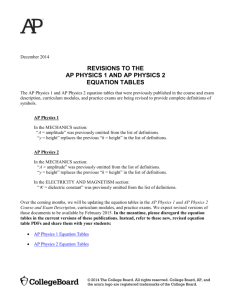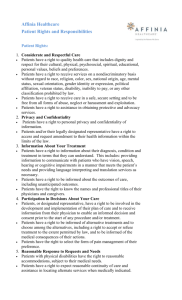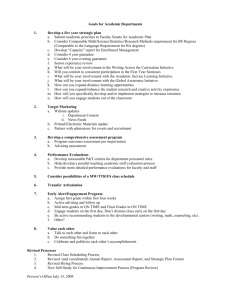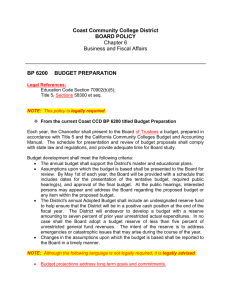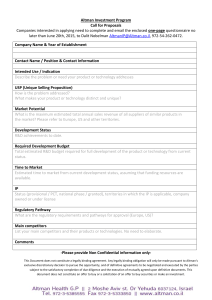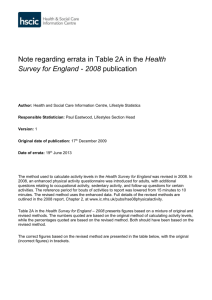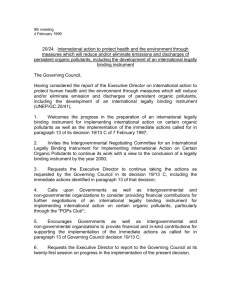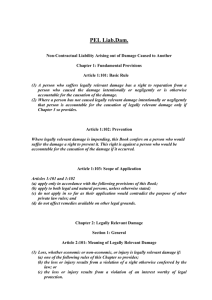Update 5 Overview - Community College League of California
advertisement
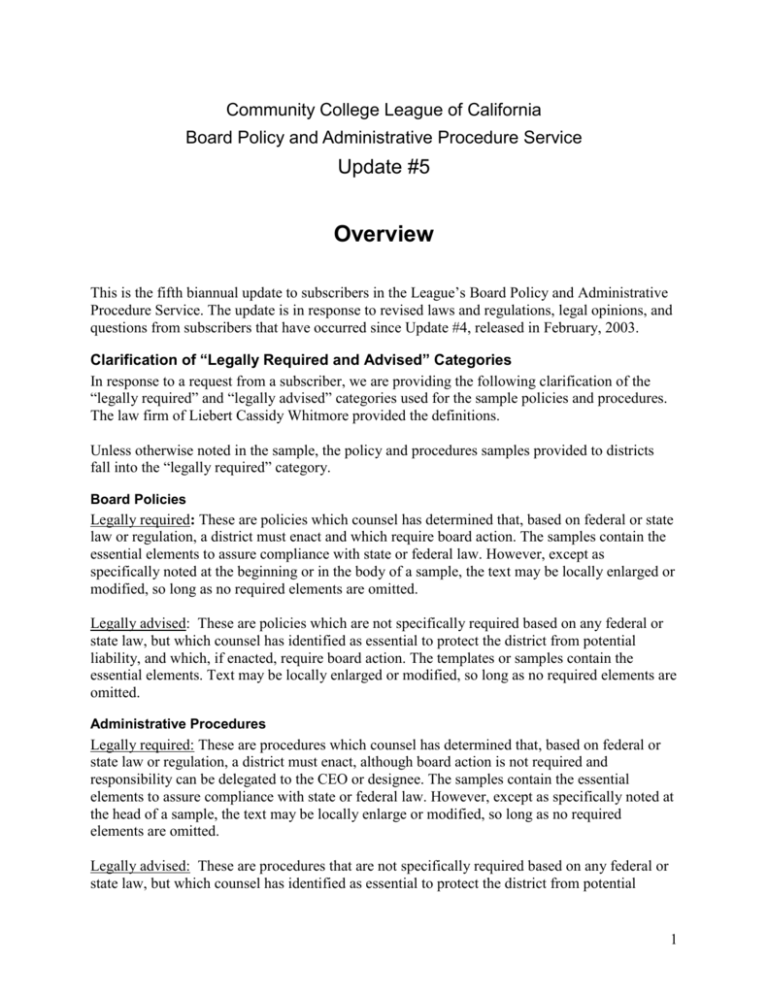
Community College League of California Board Policy and Administrative Procedure Service Update #5 Overview This is the fifth biannual update to subscribers in the League’s Board Policy and Administrative Procedure Service. The update is in response to revised laws and regulations, legal opinions, and questions from subscribers that have occurred since Update #4, released in February, 2003. Clarification of “Legally Required and Advised” Categories In response to a request from a subscriber, we are providing the following clarification of the “legally required” and “legally advised” categories used for the sample policies and procedures. The law firm of Liebert Cassidy Whitmore provided the definitions. Unless otherwise noted in the sample, the policy and procedures samples provided to districts fall into the “legally required” category. Board Policies Legally required: These are policies which counsel has determined that, based on federal or state law or regulation, a district must enact and which require board action. The samples contain the essential elements to assure compliance with state or federal law. However, except as specifically noted at the beginning or in the body of a sample, the text may be locally enlarged or modified, so long as no required elements are omitted. Legally advised: These are policies which are not specifically required based on any federal or state law, but which counsel has identified as essential to protect the district from potential liability, and which, if enacted, require board action. The templates or samples contain the essential elements. Text may be locally enlarged or modified, so long as no required elements are omitted. Administrative Procedures Legally required: These are procedures which counsel has determined that, based on federal or state law or regulation, a district must enact, although board action is not required and responsibility can be delegated to the CEO or designee. The samples contain the essential elements to assure compliance with state or federal law. However, except as specifically noted at the head of a sample, the text may be locally enlarge or modified, so long as no required elements are omitted. Legally advised: These are procedures that are not specifically required based on any federal or state law, but which counsel has identified as essential to protect the district from potential 1 liability. Board action is not required and responsibility can be delegated to the CEO or designee. The samples contain the essential elements. Text may be locally enlarged or modified, so long as no required elements are omitted. Revised Policies and Procedures BP 2330 Quorum and Voting. Education and other Code section numbers, which pertain to votes required in specific situations, have been added to the list of references BP 3410 Nondiscrimination, and BP 3430 Prohibition of Harassment. Revised to provide for consistency in listing protected classes. (These lists were updated in Update 3, but not included in Update 4, so we are correcting that error.) BP 5055 Enrollment Priorities. Title 5 section 51106 added to reference list and some language moved to new BP 5052. BP 5500 Standards of Conduct. Information has been added (also contained in AP 5500) reflecting the board’s responsibilities in expulsion. BP 7210 Academic Employees. Reference to a 5-year plan has been deleted, since it is not required. AP 4225 Course Repetition. Revised to address limits on student repetition of courses. AP 5011 Admission of High School and Other Young Students. Revised to include criteria for concurrent enrollment and open courses. AP 5030 Fees. Revised to include the reference that fees are refundable because of changes in law or regulation authorizing and establishing enrollment fees, as required by state Chancellor’s Office Legal Opinion M-03-19. AP 5052 Open Enrollment. Revised to include reference to board policy and Title 5, section 51006. AP 6360 Contracts. Electronic Systems and Materials. The title was changed from Contracts: Computers, and language related to Section 508 accessibility requirements has been moved to a new procedure, AP 6365, in accordance with Chancellor’s Office Legal Opinion M 03-09. New Policies and Procedures BP 3518 Child Abuse Reporting and AP 3518 Child Abuse Reporting. Legally advised. Chancellor’s Office Legal Opinion 02-03 defined employee obligations to report abuse of minors. BP 5052 Open Enrollment. Legally advised. Title 5, 51006 requires boards to adopt by resolution a statement regarding open enrollment of courses. This policy meets that requirement. (AP 5052 has been revised—see above). 2 BP 5570 Student Credit Card Solicitation. Legally required. Title 5 section 54400, adopted November 2002, requires boards to adopt policy, by December 31, 2003, to regulate marketing practices used on campuses by credit card companies. AP 5570 Student Credit Card Solicitation. Legally advised. Implements board policy required by Title 5 section 54400 to regulate credit card company marketing practices on campuses. AP 6365 Accessibility of Information Technology. Legally required. Provided in response to Chancellor’s Office Legal Opinion M 03-09. The language related to Section 508 accessibility requirements was strengthened and moved to this new procedure from AP 6360. Reviewed: No Revisions Included at This Time The following was reviewed and may affect District practice. However, no revisions were made to the League’s Policy and Procedure samples. IRS Ruling on Naming Rights In November 2002, the IRS issued a ruling that stated that the privileges that individuals and corporations receive by purchasing naming rights to facilities count as a personal business use of that property. Tax law states that if the value of personal business use exceeds a certain proportion of the value of the property and the costs of debt service, the IRS will revoke the bonds’ tax-exempt status. Colleges may wish to consider the implications of this ruling when colleges are entering into agreements with those making donations for facilities. However, it has no implications for the League sample policies or procedures. Use of Copyright Material In response to requests from subscribers, the League and Liebert Cassidy Whitmore are reviewing the Technology, Education, and Copyright Harmonization Act (TEACH Act) other laws and regulations related to use of copyright materials, and resources that may be helpful to districts. Update #6, scheduled for February 2004, will include a list of issues to consider and resources districts may use in developing their own procedures. 3
